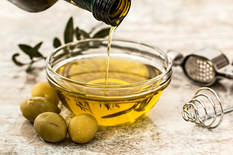 We consume oils all the time and yet we pay the very little attention to what oils we are eating, and how they may impact our long term health. Removing unhealthy, rancid and heavily processed oils is one of the most important healthy habits you can make in your diet to avoid diseases such as cancers, heart disease and intestinal disorders and to reduce fatigue, inflammation and free radicals! Understanding what oils are unhealthy and what oils are safe to eat will help to reduce those risks. Adjusting your habits at home, at the grocery store and when eating out will go a long way to making the change you may be longing for in your overall health! Avoid eating rancid oils!Unsaturated oils such as canola, olive, peanut, or vegetable oil don’t last on the shelf as long as you think since they are incredibly sensitive to heat, light and oxygen and actually go rancid in a very short time. You may not notice the off taste and it may not make you feel sick, however the increasing levels of free radicals can elevate the risk of developing diseases such as cancer and heart disease in the long term. Flavoured oils containing low-acid vegetables such as garlic or herbs and spices can cause botulism due to the rotting vegetables when they turn. Throw these old oils out! The length of time an oil lasts depends whether it is unopened and sealed off from oxygen, how it is stored and what kind of oil it is. You can see this list for specific times www.eatbydate.com/other/condiments/how-long-does-oil-last. Most oils do not last longer than two years, even unopened. An open oil not kept in the fridge may only last 3 months. You can tell it has gone off since the oil may taste bitter, stale or “off” and there is often that noticeable rancid smell. Check the expiry dates, store oils properly either in the fridge or a cool pantry, and do the smell test. Good oils can be expensive so avoid buying large amounts if you know you won’t eat it before it expires. It will be too tempting to use it even if it is old and as I mentioned, bad oil can lead to health complications later on. Use the button below to read the full article ...
0 Comments
 Do you have a hard time going number 2? According to the National Institute of Diabetes, Digestive and Kidney Diseases, constipation is one of the most common digestive problems and affects up to 13% of people in the US. It is defined as having hard, dry bowel movements or only going fewer than three times a week. I know I am typically constipated according to this definition as I don't go every day. However, when I do go it is a easy and all is fairly normal, but that was not always the case. This is in part due to my constitution and partly because of some of the factors listed below. Common factors that contribute to increased constipation:
Use the button below to read the full article ...  Heat waves are part of summer, however when they are extreme they can seriously affect our health. The people most at risk are the elderly, children, people with chronic diseases especially heart and lung issues, and people on certain medications. However anyone that is sensitive to heat can feel consequences even if it is only irritability and a loss of energy. The concern is with Heat Exhaustion and Heat Stroke. Heat Exhaustion is when your body gets too hot and can’t cool down by sweating due to dehydration. Symptoms are heavy sweating, rapid pulse, dizziness, fatigue, muscle cramps, nausea, headache and cool, moist skin with goose bumps. Heatstroke is when the body temperature rises to 104 degrees Fahrenheit or higher and at this temperature the brain, heart, kidneys and muscles may be damaged leading to serious complications, and without cooling or emergency intervention the person may die. Symptoms include altered mental state or behavior, nausea and vomiting, flushed skin, rapid breathing and racing heart rate. How can homeopathy help with the extreme heat? Homeopathy can be a very helpful intervention in cases of both heat exhaustion and heat stroke. Be sure to assess if you or the other person needs immediate emergency medical care first. Remember that homeopathy can offer a safe complement to emergency medicine. Then using the matching symptoms one of the following remedies can be selected. Belladonna: A good remedy for high heat when the face gets flushed and red. Look for dilated pupils, a throbbing headache, radiating heat with little or no sweat and sudden spikes in temperature. There may also be violent shooting pains in head, which come and go suddenly, dizziness and restlessness. The heat is in the hot face, the hot temper and hot flushes although the hands or feet may be cool. It is easy to confuse Belladonna and Glonoine since they both have a hot head and glassy, staring eyes but in Belladonna you see the dilated pupils and the face will typically be red. Glonoine: This is another great remedy for heat when you see staring, glassy eyes, pupils contracted, pulse barely perceptible or so quick it can’t be calculated, congestion and throbbing, loss of speech, face pale, cold sweat, body cold and head hot to the touch. This remedy is for effects of sun- stroke and hyperemia (excess if blood) of the brain from excess of heat. Generally worse in the sun. Aconite: Here you will see heat in the whole body, contracted pupils, a full pulse. There will be a lot of anxiety and restlessness. Often after lying with head exposed to the direct rays of sun. There is faintness and dizziness. Aconite is good for when the temperatures change rapidly, so feels unwell after exposure to a sudden cold wind or sudden exposure to hot weather, since this causes a shock to the body. Gelsemium: Another shock remedy, this is useful in sunstroke with a high body temperature and drowsiness, sleepy or a comatose state, and oddly a lack of thirst, refuses water. Lachesis: A great remedy for sun headaches, faintness and dizziness. Hot flashes, hot sweats, hot heavy headaches and the fatigue that follows heat, this remedy is very cooling when there is a lot of heat. Bryonia: There is great thirst for water, feels better with rest and being quiet. There will be a feeling of dryness, mucous membranes seem dry and throbbing, bursting headache. There is irritability, mostly due to pain with any movement because of lack of fluids/moisture. Ferrum-phos cell salt: When there is redness, heat, headache, minor fatigue or low fever in the first stages of irritation or illness from too much heat or sun. The result is a feeling of physical weakness, fatigue and you don’t feel right but it is not extreme. This remedy can be of general use for a speedy recovery from feeling unwell after a day in the sun! To help choose a remedy, or for more information on how to take a homeopathic remedy you can talk to a homeopath or visit a shop with a homeopathic consultant. Many homeopaths offer a half hour or acute session reduced rate for issues like heat stroke or sun complaints such as sunburns, dehydration or headaches! |
Lauren TrimbleHomeopath and Holistic Practitioner. Archives
October 2022
|

